Best
Beginner Trumpet
-
Overall: The Smaller Valve Block Makes It Easier To Grip The Trumpet
-
Best Feature: The Lead Pipe Is Easy-Blowing And Has Fantastic Tuning
-
TedScore™: 8/10
Best
Overall Trumpet
Stradivarius Series THE ULTIMATE TRUMPET FOR PROS
-
Overall:
One-Piece Hand-Hammered Bell For An
Epic Tone Quality -
Best Feature: Monel Alloy Pistons For A Smooth And
Groovy Action -
TedScore™: 9/10
Best
Intermediate
Trumpet
-
Overall: Hand-Hammered One-Piece Bell For Superior Tone Quality
-
Best Feature: Big And Bold Bore Size For A Warm And Rich Sound
-
TedScore™: 7.5/10
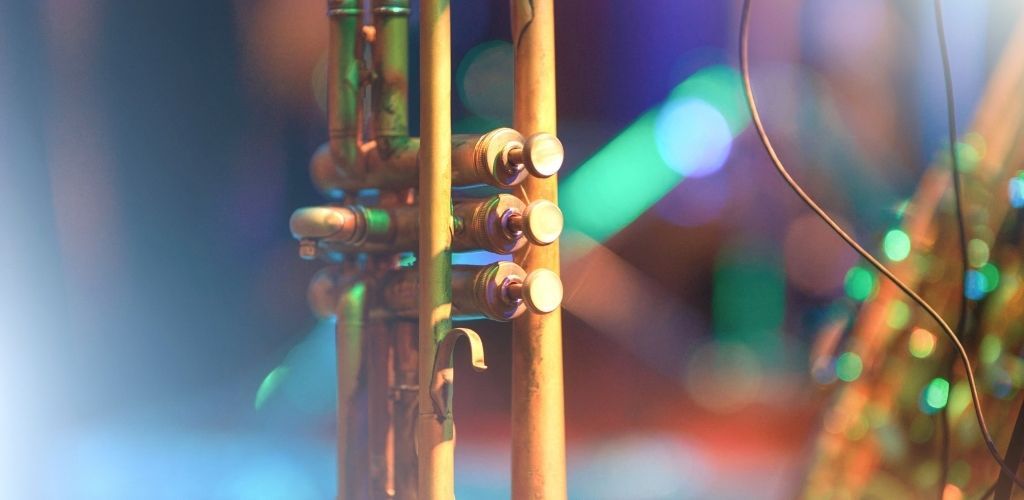
When I got my hands on the best trumpet on the market, it felt like discovering a hidden treasure! It’s like finding that perfect musical buddy who can match the high notes of life with every note you play.
After jamming with the Bach 180S37 Stradivarius Series Trumpet, it’s a quality symphony that could be music to any trumpeter’s ears.
You see, the trumpet is more than just a brass instrument; it opens the door to jazz, orchestra, and beautiful solos. Whether you’re new to music or a pro, the right trumpet can transform your sound, and I’m here to help you find the perfect match.
So, let’s keep the rhythm rolling and learn more about the best trumpet to make your next performance stand out!
Trumpet Reviews:
Top Picks for Every Level
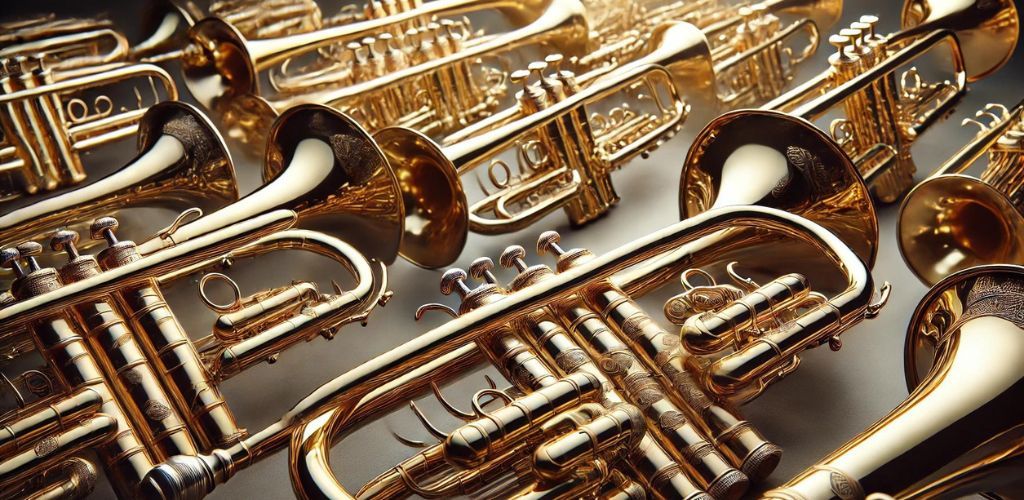
Choosing the right trumpet can change everything, whether you’re just starting, getting better, or performing like a pro. Let’s explore some great trumpets that suit every level of playing.
Best Trumpets for Beginners
King
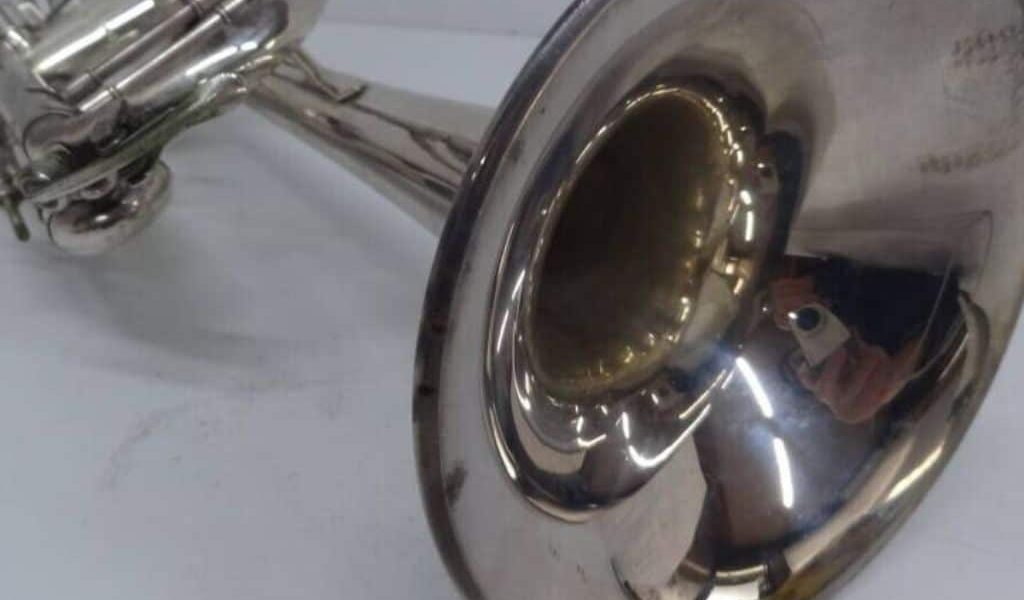
Let’s talk about King. King trumpets are like a steady hand guiding you through a musical journey.
They’re crafted to be robust and lively, providing an incredible platform for intermediate players who seek a trumpet with a regal sound that projects confidence in each note.
KING Trumpet-Standard, Silver (2055T)
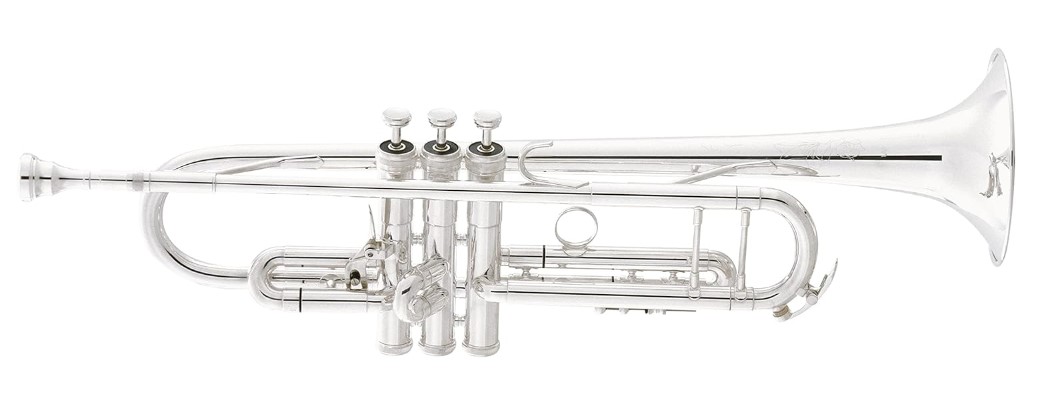
FEATURES:
- Medium-large bore for
a warm and rich sound
- Silver-plated finish for a
classic look and feel
- Produces a warm and rich sound with excellent tonal quality
- Classic and elegant appearance
- Affordable price point for a high-quality trumpet
- May not have as many advanced features as some other intermediate-level trumpets
- Silver plating may require more maintenance and upkeep than other finishes
When you click ‘Check Price’, you’ll see there are loads of great places to buy this item. Our personal favorite is Sweetwater for the US, and Thomann and Gear4Music for the UK & Europe.
They are the largest music retailers, with excellent customer service, competitive prices, really fast shipping, and the longest guarantees.
The professional musician who wrote this article combined many things,
from the product build, manufacturer’s reputation through to feedback
from other users, to create our famous TedScore™.
Besson
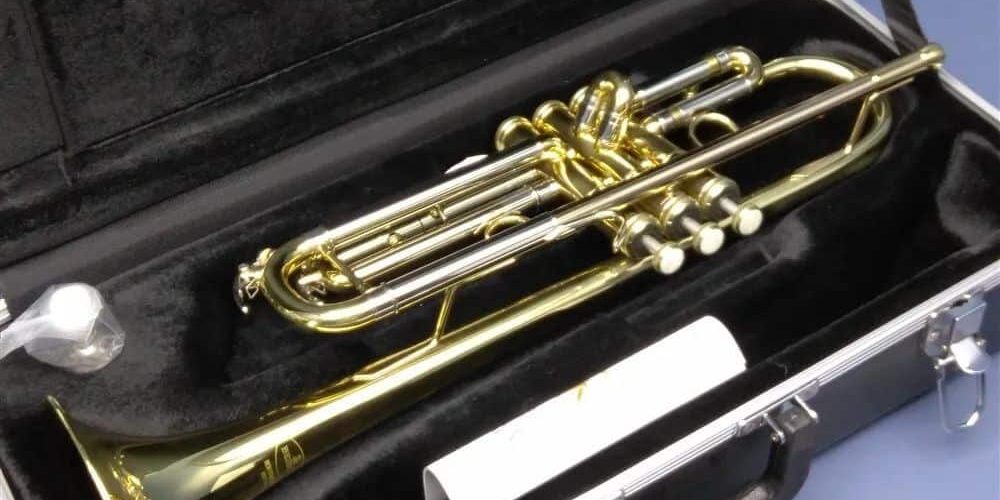
I’ve always found Besson trumpets like old friends who never let you down. Their intermediate models are a testament to Besson’s commitment to quality that’s intertwined with history. Known for their rich, warm sound, these trumpets bring a sense of depth to any performance.
Besson BE110 New Standard Bb Trumpet Package, Clear Lacquer
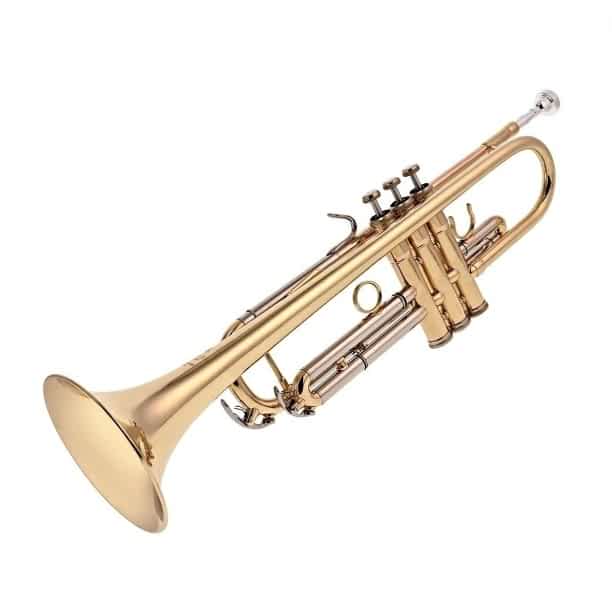
FEATURES:
1. The smaller valve block makes it
easier to grip the trumpet
2. The lead pipe is easy-blowing
and has fantastic tuning
OTHER INFO: Text
- Everything you need to get started is included
- Designed specifically with beginners in mind
- Slightly more expensive compared to other brands
When you click ‘Check Price’, you’ll see there are loads of great places to buy this item. Our personal favorite is Sweetwater for the US, and Thomann and Gear4Music for the UK & Europe.
They are the largest music retailers, with excellent customer service, competitive prices, really fast shipping, and the longest guarantees.
The professional musician who wrote this article combined many things,
from the product build, manufacturer’s reputation through to feedback
from other users, to create our famous TedScore™.
Top Intermediate Trumpets
Jupiter

Jupiter is like that innovative mate who’s always got a new trick up their sleeve.
Their intermediate trumpets, especially the Jupiter 1100S discussed in the search results, cater to musicians looking to step up their game. The tangible feel of progression and a splendid blend of affordability and advanced features make them a go-to choice.
Jupiter JTR1100 Trumpet, Clear Lacquer

FEATURES:
- Hand-hammered one-piece bell
for superior tone quality
- Big and bold bore size for
a warm and rich sound
- The trumpet is a party starter
with its warm and rich sound quality
- Produces a warm and rich sound that's perfect for grooving to different musical styles
- The trumpet is versatile and can adapt to any party mood
- May not have as many bells and whistles as some other intermediate-level trumpets
When you click ‘Check Price’, you’ll see there are loads of great places to buy this item. Our personal favorite is Sweetwater for the US, and Thomann and Gear4Music for the UK & Europe.
They are the largest music retailers, with excellent customer service, competitive prices, really fast shipping, and the longest guarantees.
The professional musician who wrote this article combined many things,
from the product build, manufacturer’s reputation through to feedback
from other users, to create our famous TedScore™.
Best Professional Trumpets
Bach
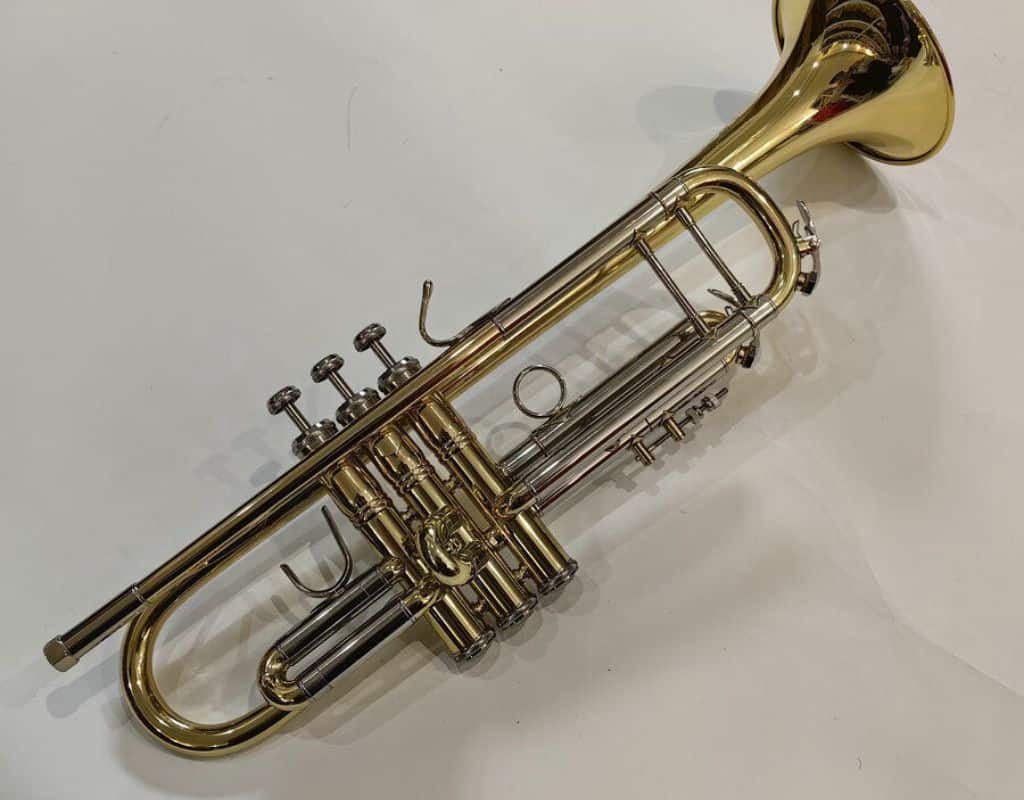
Bach is the crème de la crème when it comes to trumpets, with a heritage steeped in excellence. I’m always impressed by their meticulous attention to detail, which shines through in each trumpet’s superior sound.
Bach Stradivarius 18037

FEATURES:
- One-piece hand-hammered bell for
an epic tone quality
- Monel alloy pistons for a
smooth and groovy action
- Large bore size for a
full and funky sound
- Produces a full and funky sound with excellent tonal quality
- Smooth and groovy action enables precise playing
- High-quality construction ensures reliable and consistent performance
- Comes with a higher price tag than intermediate or beginner-level trumpets
When you click ‘Check Price’, you’ll see there are loads of great places to buy this item. Our personal favorite is Sweetwater for the US, and Thomann and Gear4Music for the UK & Europe.
They are the largest music retailers, with excellent customer service, competitive prices, really fast shipping, and the longest guarantees.
The professional musician who wrote this article combined many things,
from the product build, manufacturer’s reputation through to feedback
from other users, to create our famous TedScore™.
Understanding
Trumpet Basics
It’s important to understand the basics—what makes a trumpet a trumpet? I’ll show you the different types, their main parts, and how they captivate us with their music.
Types of Trumpets
Trumpets come in various flavors, each with its unique charm.
The B♭ trumpet is the most popular and widely renowned for its rich, adaptable sound that fits snugly in most musical ensembles.
C trumpets are a hit with orchestral players, thanks to their slightly brighter tone that stands out in a harmonious setting.
The higher-pitched D trumpet is perfect for baroque music, where precision and clarity take center stage.
Piccolo trumpets, petite and fascinating, are the go-to for complex baroque pieces.
If you’re looking for something compact, the pocket trumpet has all the punch of a standard B♭ but in a conveniently small package.
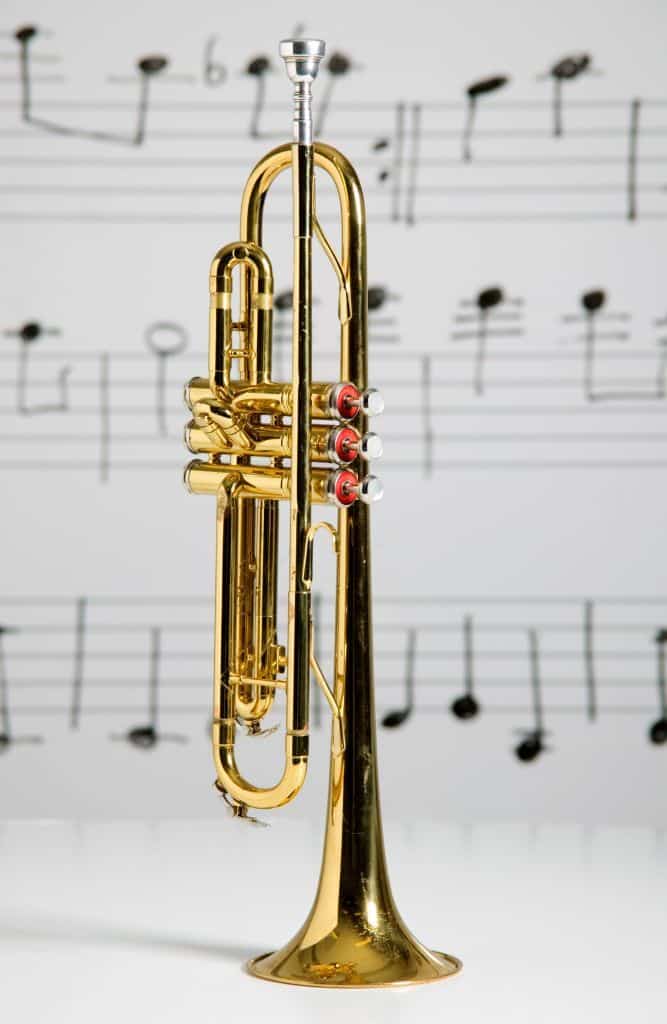
Key Components of a Trumpet
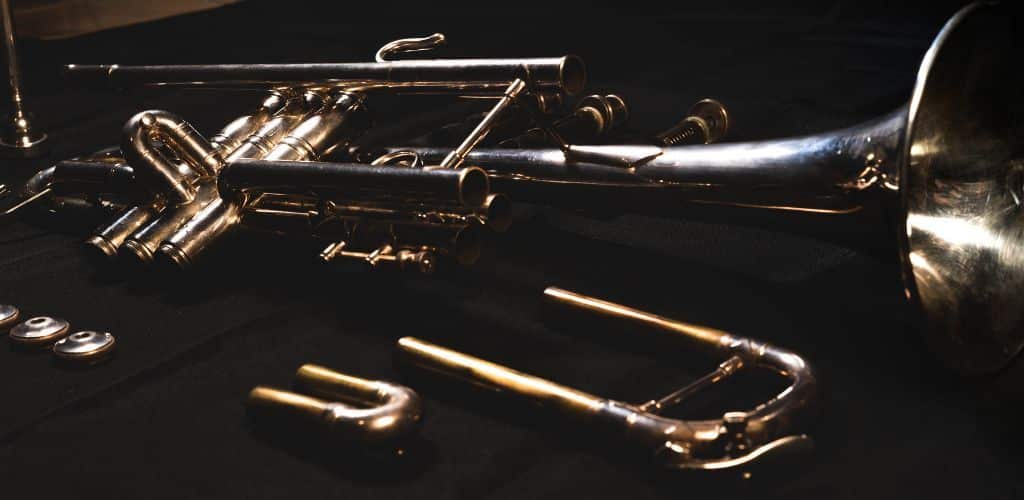
Let’s peek behind the scenes and see what makes a trumpet work.
The mouthpiece is where the magic starts; I set my lips in motion to create the sound.
Valves are like the heart of the trumpet, controlling airflow and changing pitches as I press them down.
The trumpet’s body is a pathway of brass tubing, which culminates in the bell, where the sound waves emerge, all grown up and ready to impress.
How Trumpets Produce Sound
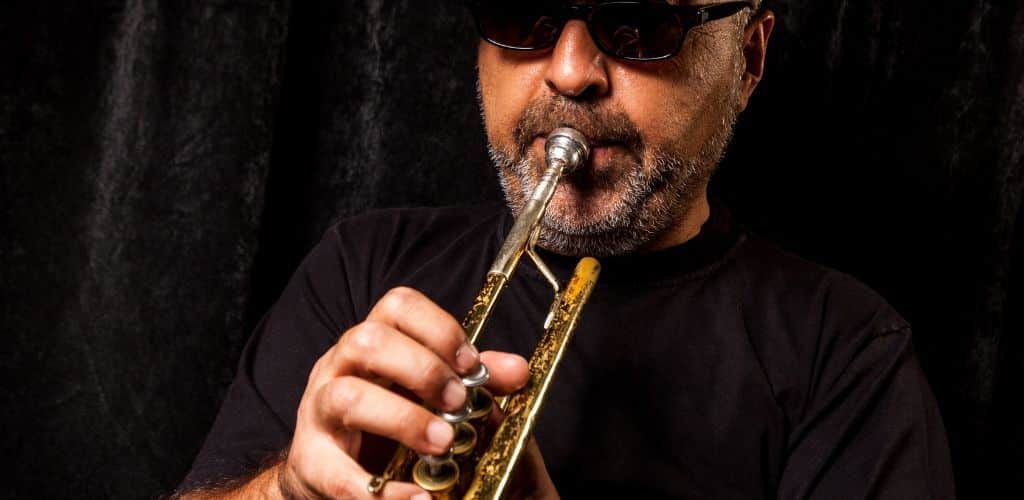
I’ll let you in on a little secret about how trumpets sing. It begins with a buzz from my lips into the mouthpiece, not unlike blowing a raspberry at the dinner table (but with more finesse, of course).
This buzz hustles through the trumpet’s tubing, accelerating with every valve I press, until it erupts from the bell as a glorious, brassy melody that fills the room with sonic sunshine. It’s a thrilling process that hinges on breath, precision, and a bit of that trumpeter’s flair.
Factors to Consider When Buying a Trumpet
When I’m looking for a trumpet, I focus on the important details to make sure I find the right one. Here are the main things I look at:
Skill Level and Trumpet Types

For me, recognizing where I stand on the skill spectrum is crucial.
If I’m a beginner, I’d lean towards trumpets with a small bore and a standard mouthpiece like a 7C, which makes learning easier. As I progress to an intermediate level, I hunt for something that offers more resistance and a fuller tone, leading me to a medium-bore trumpet with a 3C mouthpiece.
I’d recommend high-end models built for exceptional sound quality and responsiveness for those at the professional tier.

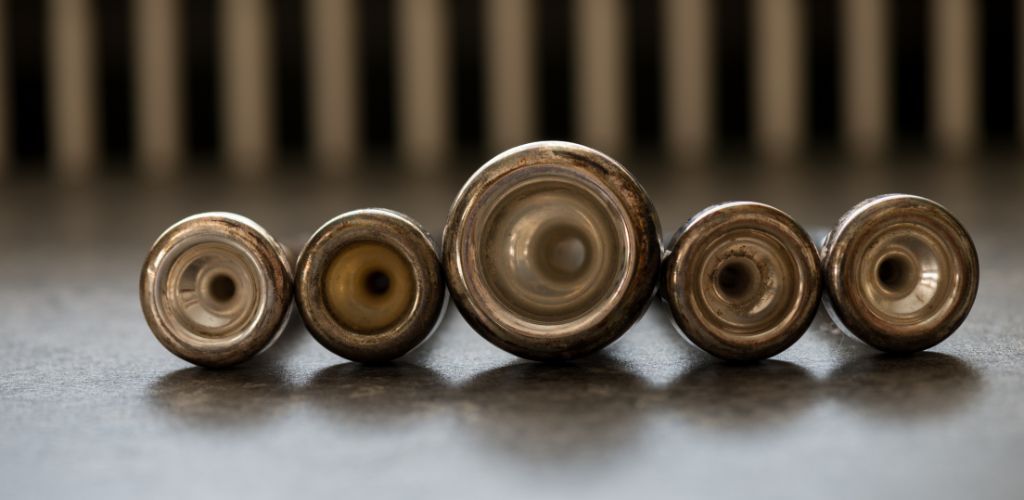
Embouchure takes patience and consistency, wouldn’t you agree?
My journey began with soft, long tones to build those facial muscles, and a stable embouchure helped me hit the notes just right. Some say it’s like the foundation of my musical house!
Here’s a quick look at my take on these mouthpieces:
7C Mouthpiece: Ideal for beginners, smaller diameter.
3C Mouthpiece: Preferred by advanced players, larger diameter for a rich tone.
Finding that perfect mouthpiece is personal. It’s like a quest to find the Holy Grail of my trumpet’s soul. Trust me, it’s harmony in the purest form when you see the one!
Material and Build Quality
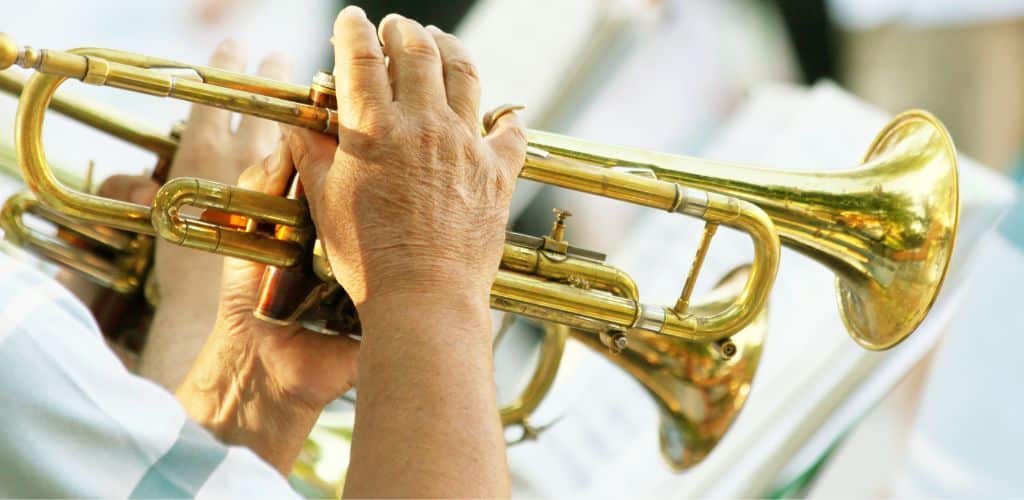
Material influences sound, so I take my time here.
Yellow brass is often favored for its rich, warm tones; it’s a solid pick for players at any level. Some trumpets feature silver plating, which can add a brighter edge to the sound.
I always check for Monel pistons – they’re known for their durability and smooth action, two qualities I wouldn’t compromise on.
Quality and Craftmanship

Good intonation leads to a more harmonious performance, so I listen for pitch accuracy in each instrument. Trumpets with smooth, fast-responding valves, often made from Monel, allow me to play complex pieces precisely.
I make sure the valves don’t stick and spring back quickly; anything less is a no from me.
Finish and Coatings

The finish isn’t just for show, you know. It affects your trumpet’s sound and can even influence its durability. Choices abound, from the classic clear lacquer to the more posh gold plating.
The silver-plated finish, for example, isn’t just striking; it helps protect your trumpet and sustain that lustrous sound longer. Think of it as your trumpet’s knight in shining armor.
Accessories and Extras
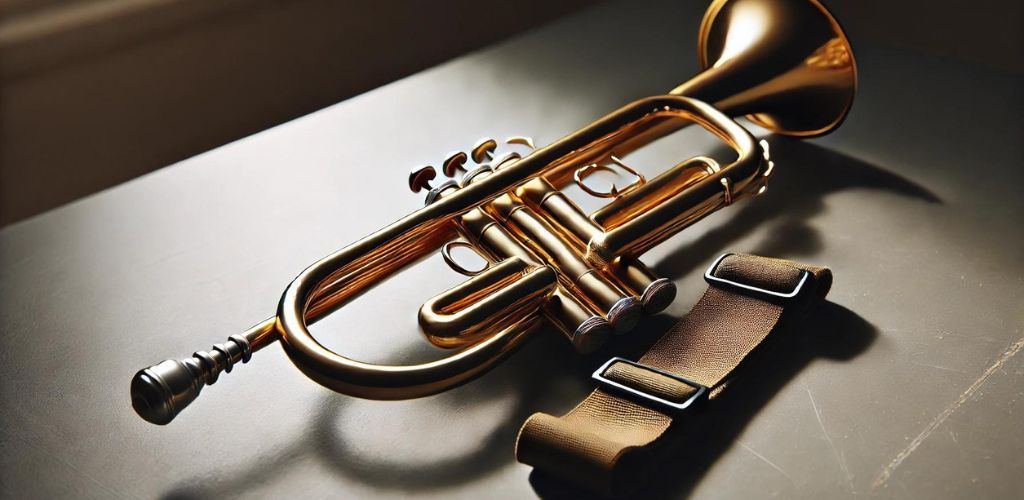
Finally, I peek at the goodies that might come with the trumpet. I love finding a hard case that promises to keep my new companion safe.
Many trumpets also come with cleaning kits, which, let’s face it, save me a trip to the store and a bit of dosh. The little things like these can really sweeten the deal for me.
Valve Types and Their Impact
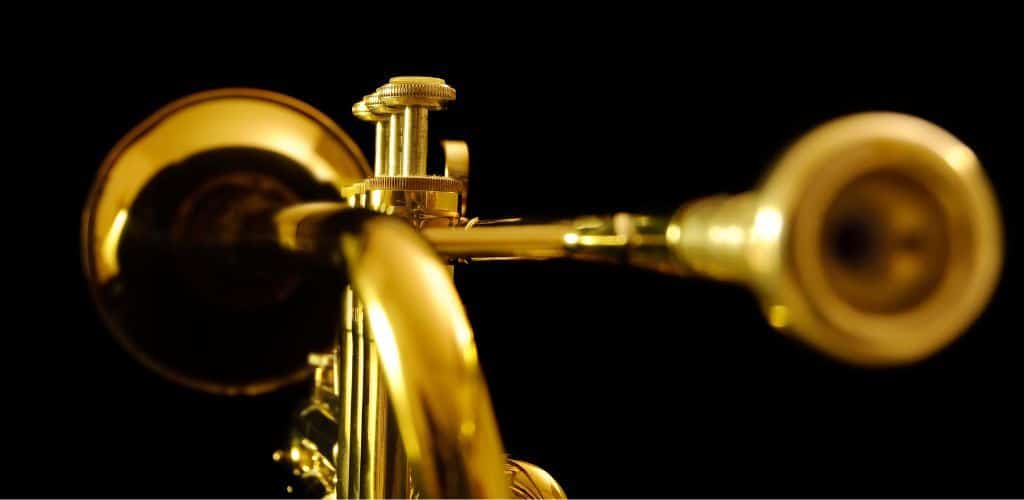
I can’t skip the part about valves – they’re the heart of a trumpet’s changeability and sound.
You see, there are primarily two valves: piston and rotary valves. Pretty standard piston valves have a lightning-fast response that brings a beautiful lightness to the sound.
On the other hand, rotary valves are the darlings of the orchestral world, giving a warmer tone with a unique character.
Now, let me tell you about Monel pistons. These little gems are known for their resilience and low maintenance.
They are resistant to corrosion, so they’ll stay snug and smooth even if you’re playing your trumpet daily. That’s the kind of durability that gives me peace of mind!
Here’s a nifty table to help you visualize the differences:
- Bright and responsive.
- Regular oiling needed.
- Warm and mellow.
- Less frequent lubrication.
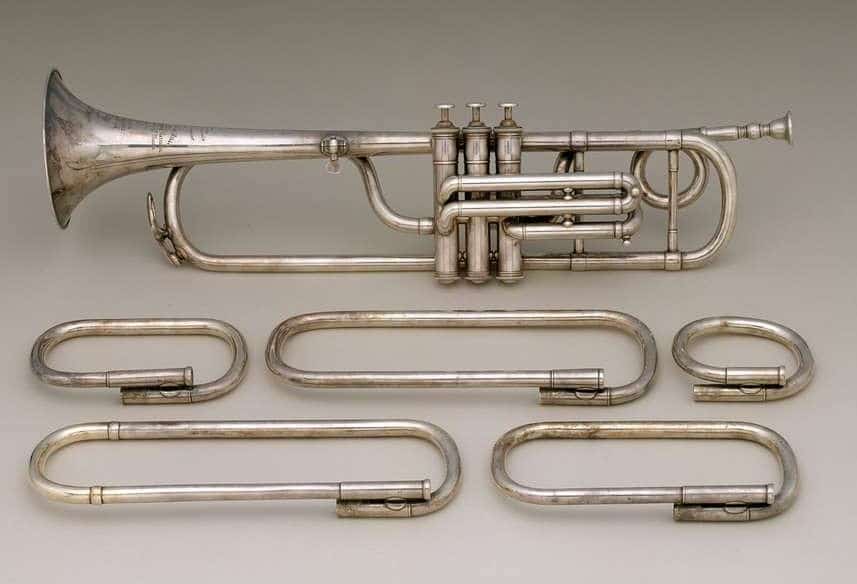
So, the type of valve on your trumpet will influence the sound and how often you’ll reach for the valve oil.
Musicians like me who gig regularly might lean towards the Monel pistons — it’s just one less thing to worry about.
Whether you’re into the robust sound of a rotary or the zippy feel of a piston valve, remember to give them a bit of TLC, and they’ll keep your tunes soaring beautifully!
Sound and Intonation
When I look for the perfect trumpet, I pay close attention to its sound and intonation. It’s like finding a friend who speaks the same musical language.
The brilliance of a trumpet’s sound is fundamental, and a rich sound often marks a professional instrument. If I’m looking for depth, I lean towards a trumpet known for its warm tone.
Playing it myself tells me loads about a trumpet’s playability and intonation. There’s nothing quite like feeling the trumpet come alive in my hands.
Intonation is critical – a trumpet that can’t stay in tune is like a clock that can’t tell time. It’s all about precision, and superb intonation ensures that every note is spot on.


Some trumpets boast a bright sound that cuts through any ensemble like a knife through butter. This sound is ideal for lead players in jazz and commercial settings.
Some trumpets have a warm tone that feels as cozy as a cup of tea on a rainy day, great for playing in orchestras or smaller, more personal settings.
A finely crafted trumpet allows for a rich sound across all registers. It’s like a painter having a full spectrum of colors.
Ultimately, my trumpet should quickly respond to my touch and enable me to express music effortlessly. Sound and intonation are the heart and soul of the instrument, making every note I play tell a story.
Accessories for
Trumpet Players
When jazzing up my trumpet repertoire, I know my performance isn’t just about the notes. My secret sauce: Accessories!
They’re the unsung heroes that keep my trumpet on point and my sound crisp. Let’s talk about what’s in my toolkit that takes my trumpet playing up a notch or two.
Mouthpieces
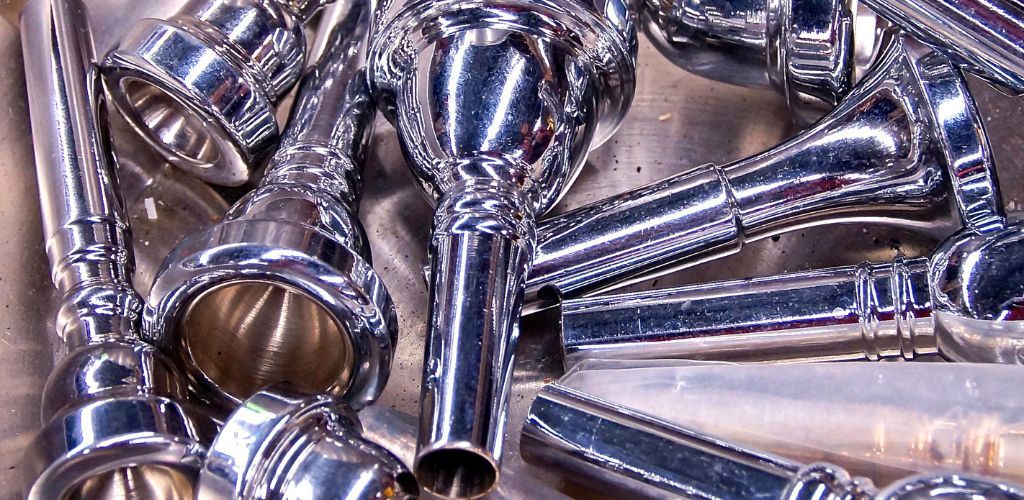
The 7C mouthpiece for beginners. It’s brilliant for its comfortable feel and bright tone.
The 3C mouthpiece, my go-to for a fuller, warmer sound, ideal when I’m aiming for those heartwarming melodies.
For the Students
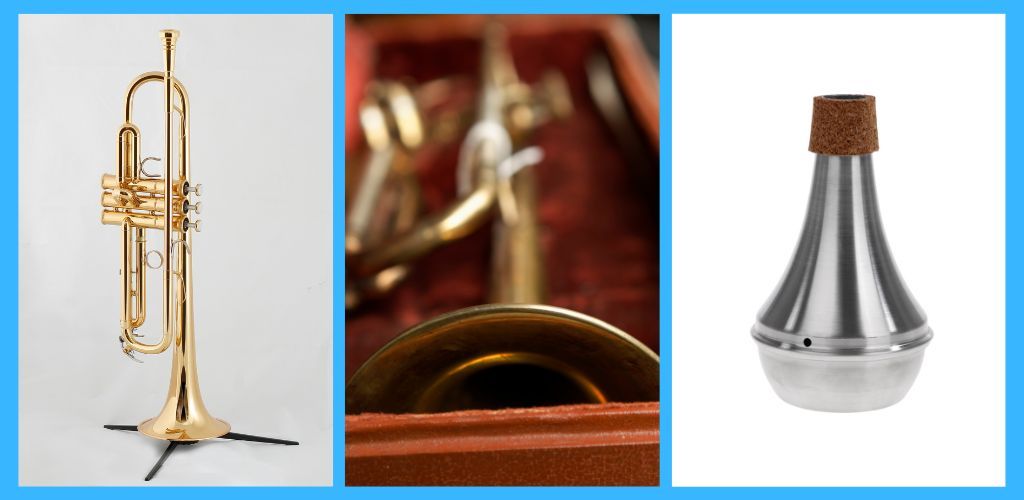
Practice Mutes: To keep the peace with neighbors and family, a practice mute becomes your best friend.
Sturdy Case: A durable case is a lifesaver for your precious horn’s safety as you lug it to lessons and practices. It’s my trumpet’s travel buddy, protecting it from the knocks and bumps of life on the move.
Stands: a sturdy 5-legged one is my steadfast buddy, keeping my trumpet safe when I take a breather.
For the Pros
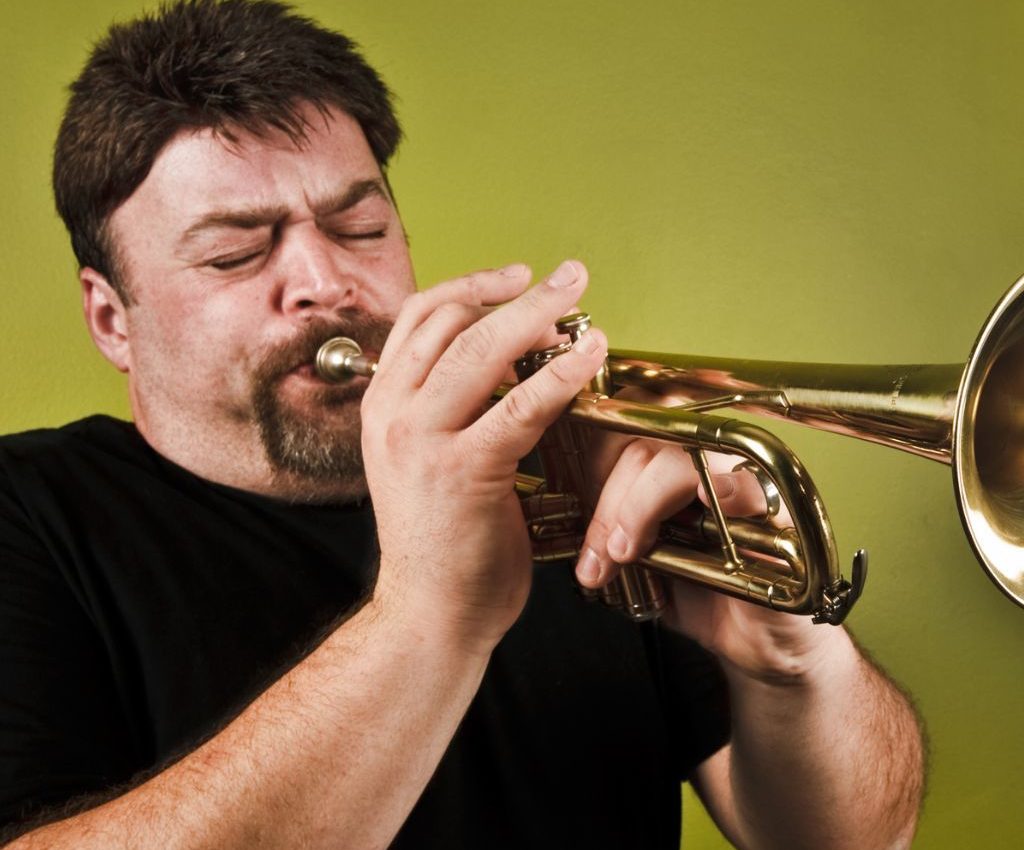
Embouchure Trainers: Professional or not, keeping your chops in shape is vital; an embouchure trainer ensures you’re always performance-ready.
It is a nifty tool for keeping my embouchure muscles shape- even when my trumpet’s out of reach. It’s like having a mini-gym for my facial muscles right in my pocket.
Enhancements: Valve oil and slide grease are the unsung heroes for a smooth performance; always take advantage of these essentials.
As for extras, I ensure it has enough room for all the bits and bobs I need. Accessories might seem like add-ons, but trust me, they’re essentials that keep my trumpet and me at the top of our game.

How to Maintain Your Trumpet
Maintaining my trumpet is something I’ve come to enjoy—it’s the secret to a shiny performance every time! It’s not just about keeping my musical instruments looking good but ensuring it sounds its best for years.
Regular Cleaning and Care
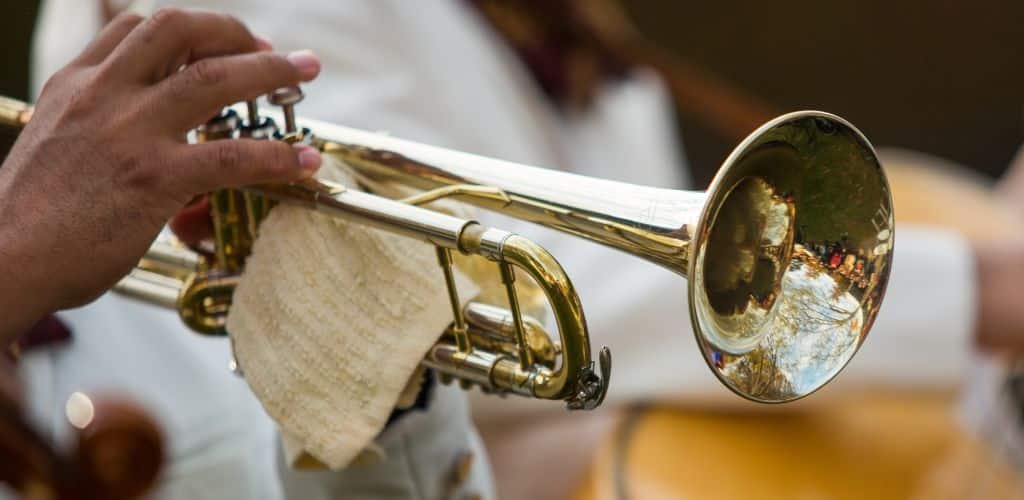
I always start by gently disassembling my trumpet—removing the mouthpiece, tuning slides, and valves.
Then it’s a warm, soapy bath for all the non-valve parts; mild dishwashing liquid does the trick. I gently scrub with a soft brush to remove grime and then rinse everything with warm water.
Next, I deal with the valves, often made of monels for durability. I wipe these with a lint-free cloth and use a valve brush on the casings for a deeper clean.
Once all parts are spotless and dry, I apply valve oil—just a few drops—to keep the action smooth and ensure my Monel pistons don’t seize up.
Dealing with Valve Issues
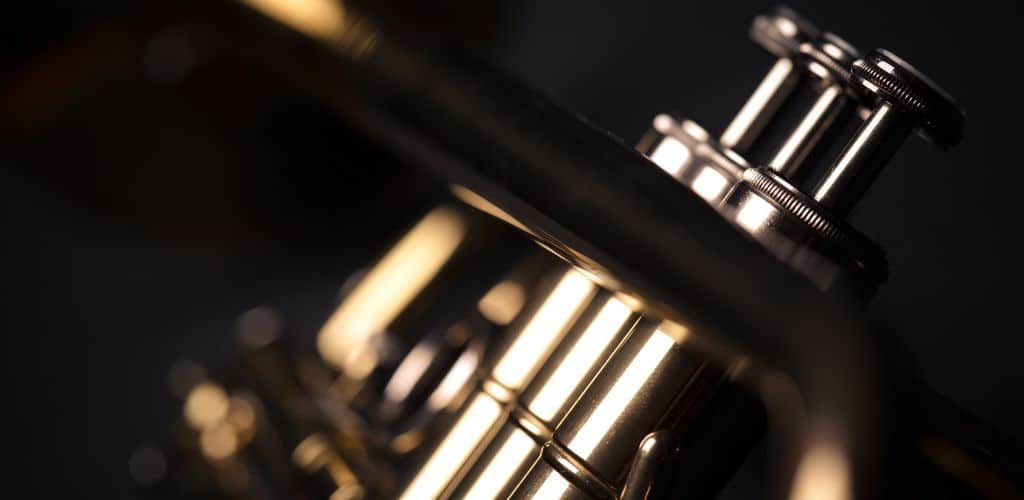
I always start by gently disassembling my trumpet—removing the mouthpiece, tuning slides, and valves.
Then it’s a warm, soapy bath for all the non-valve parts; mild dishwashing liquid does the trick. I gently scrub with a soft brush to remove grime and then rinse everything with warm water.
Next, I deal with the valves, often made of monels for durability. I wipe these with a lint-free cloth and use a valve brush on the casings for a deeper clean.
Once all parts are spotless and dry, I apply valve oil—just a few drops—to keep the action smooth and ensure my Monel pistons don’t seize up.
Understanding Your Trumpet's Warranty
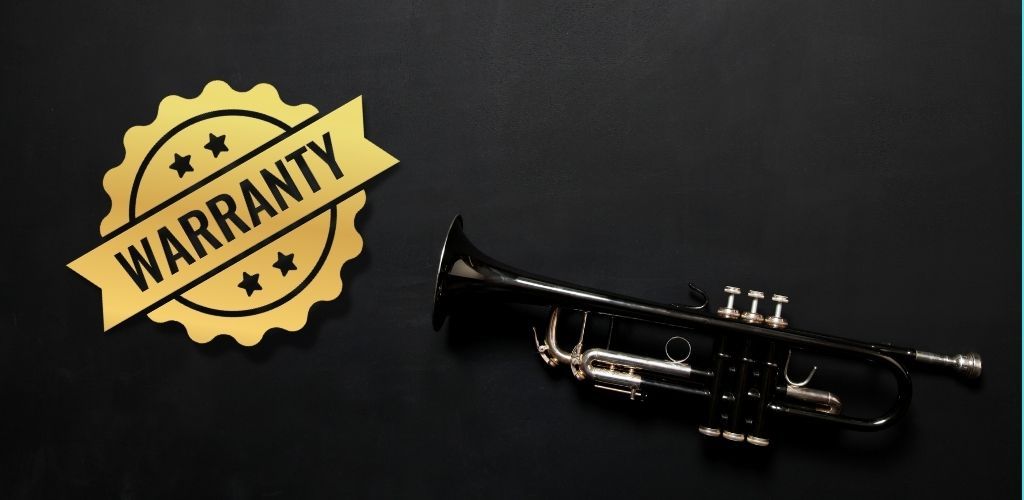
I’ve learned it’s wise to read my trumpet’s warranty carefully. It details the services covered and how long, which can save a heap of trouble and money.
Some warranties cover routine maintenance, while others may handle manufacturing defects.
Key points tingling in my brain, I hang onto the warranty card and receipts. I follow recommended care routines to stay within warranty terms and avoid unauthorized repairs, just in case I ever need to claim.
Now, if I ever face a serious issue I can’t fix, back to the manufacturer, it goes—no questions, no quibbles.
Learning to Play:
Tips and Techniques
I will give you some valuable tips to help you better play the trumpet. These tips are all about improving your skills, from building a solid embouchure to controlling your breath for better sound.
Developing a Solid Embouchure
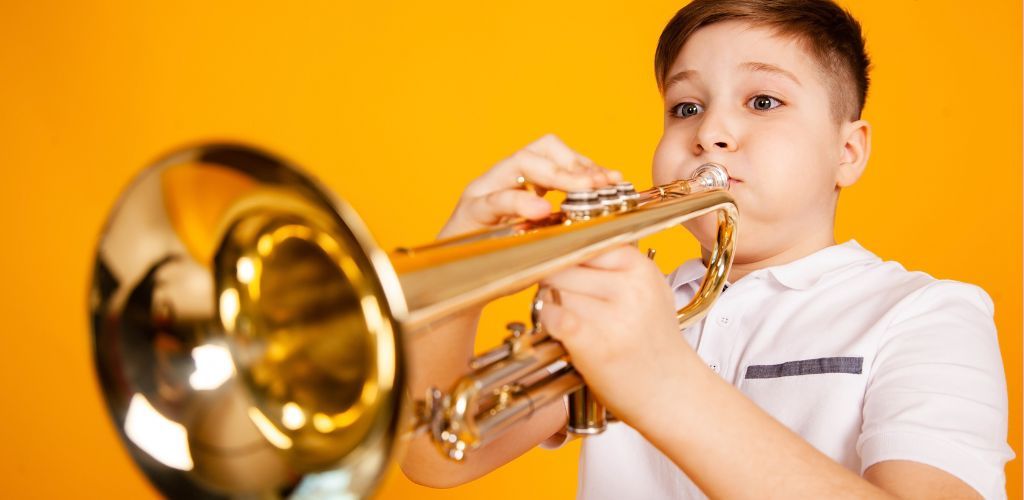
Building a solid embouchure is fundamental to playing the trumpet quickly and precisely. It’s all about how you form your lips, facial muscles, and teeth placement when you blow into the mouthpiece.
Starting with a proper, firm embouchure can significantly increase your instrument’s playability and pave the way for a rich sound. Remember, patience and persistence are key— keep those corners of your mouth firm and chin flat.
Improving Breath Control and Sound Quality

Breath control is my secret sauce for an outstanding trumpet performance.
You see, the way you breathe not only powers the notes but also shapes the sound quality. Initiating breaths from the diaphragm provide a stronger, steady airflow, leading to a consistently rich sound that’s music to anyone’s ears.
And don’t rush it! Slow, deep breaths will help maintain a stable sound, especially when reaching for those high notes.
Enrolling in Trumpet Lessons
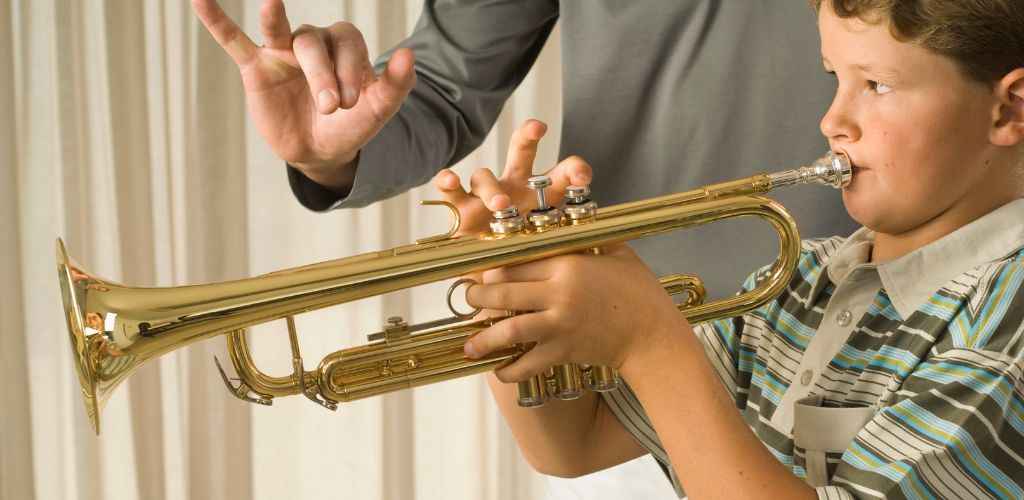
If you’re serious about getting good, enrolling in trumpet lessons is a game-changer.
A structured learning plan can iron out any wrinkles in your technique and boost your progress. You’ll get tailored advice on mechanics and style — the stuff I could have only dreamed of figuring out independently.
Plus, the expert feedback is brilliant for keeping you on track. Lessons are a fabulous investment in your musical journey, whether online or in person.
Trumpet Performance:
Genres and Contexts
The instrument’s versatility across different genres blows me away when I think about trumpeting. No pun intended!
The trumpet has something for everyone, whether it’s the soaring melodies of a classical concerto or the improvisational riffs in a jazz club.
Classical Trumpeting

In classical music, the trumpet is the king of grandeur and ceremony.
Take a page from Wynton Marsalis, and you’ll find that the trumpeter’s role involves precision and finesse.
Orchestral settings or solo performances call for top-tier investment in a quality instrument, as the nuances in tone and dynamics are fully displayed.
Jazz and Contemporary Trumpet

In classical music, the trumpet is the king of grandeur and ceremony.
Take a page from Wynton Marsalis, and you’ll find that the trumpeter’s role involves precision and finesse.
Orchestral settings or solo performances call for top-tier investment in a quality instrument, as the nuances in tone and dynamics are fully displayed.
Soloist Versus Ensemble Playing
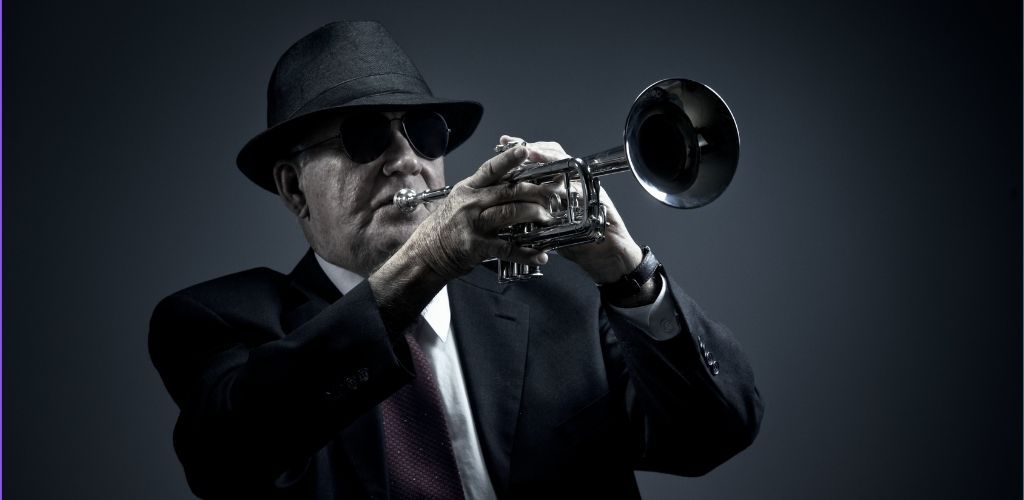
Now, dabbling as a soloist, I revel in the spotlight, my trumpet and I telling our tale.
But ensemble play has a certain magic, where my trumpet contributes to a collective narrative. It’s like being part of a musical tapestry, each thread vital to the overall picture.
Notable Trumpet Players and Their Impact
In this section, we’ll peek at the luminaries who’ve shaped the world of trumpet playing. From revered historical figures to trailblazing contemporary artists, I’ll walk you through the movers and shakers integral to this spirited instrument.
Historical Legends
Harry James was nobody’s fool when it came to the trumpet. His profound influence resonates within the jazz community, proving that solid technique and soulful playing never go out of style.

Moving on, Louis Armstrong, a name synonymous with the trumpet, used his horn to inject personality and joy into music, shaping jazz as we know it.

Contemporary Trumpet Icons
Now, let’s chat about Wynton Marsalis—he’s nothing short of a trumpet virtuoso, and his efforts in education and performance keep the spirit of jazz alive and kicking. The man’s as adept at classical music as jazz; talk about a double threat.

On the gear side, David Monette is the go-to for many jazz and classical players for custom trumpets that punch sound and aesthetics.
Speaking of trumpet craftsmanship, Vincent Bach, an acclaimed trumpeter, turned his passion into a legacy of quality with the Bach Stradivarius trumpet—loved by professionals for its rich sound. That’s a testament to the impact of top-notch engineering meeting musicianship.
Investing in a Trumpet:
Cost Versus Value
When I’m in the market for a trumpet, I know I’m not just buying a brass instrument; I’m investing. Whether a beginner or aiming for the professional stage, I must weigh the cost against the potential long-term value.
Budgeting for Beginners and Students

I remember starting with my first trumpet; budgeting was crucial.
Student trumpets generally range from £300 to £800, but affordable doesn’t mean cheap quality. I set my sights on models where durability and ease of play were top priorities, ensuring my investment was sound.
Features in affordable models include robust construction and reliable valves, often made from materials like nickel silver.
Mid-Range Investments for Intermediate Players
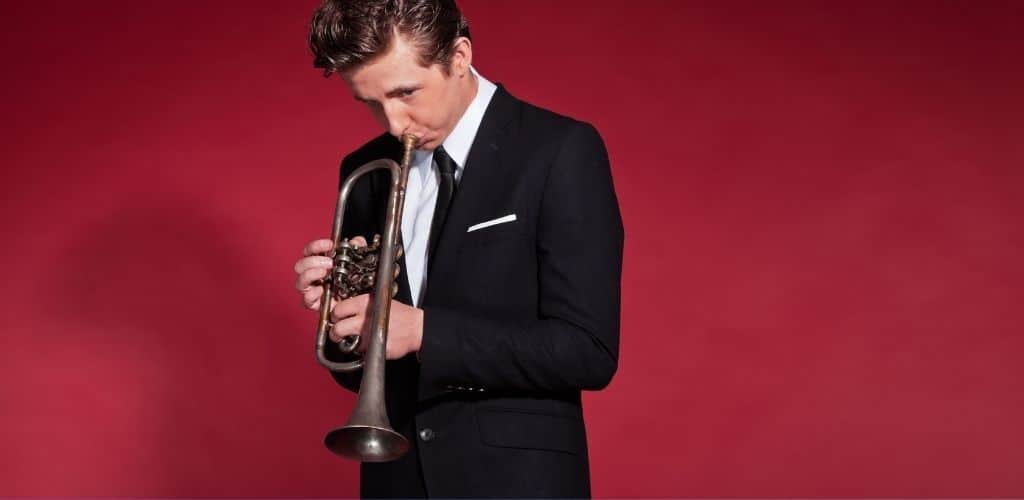
Once I had outgrown my beginner trumpet, I knew the next step was an intermediate model. Prices for these range from £800 to £1500.
This is where I looked for enhanced features such as improved bell design for better sound projection. I paid close attention to models offering a medium-large bore size, as it ensures a balance between a rich tone and agile response, which is perfect as my skills develop.
Professional Trumpets Cost

But what about when I’ve got my sights set high, aiming for the stars with a professional model?
Well, that’s when the numbers start climbing. Professional-level trumpets begin at around $1500 and can soar to over $4000.
For a trumpet that’s top-notch, it’s not just a purchase; it’s a commitment to excellence.
Here’s a quick snapshot:
Affordable Models: Around $300-$800
Intermediate Models: Between $800-$1500
Professional Models: Starting from $1500 to $4000+
Starting with an affordable model is bright, like testing the waters before making a big commitment. But when I’m ready for a top-notch trumpet that speaks to me, saving up for a professional one is the way to go.
Best Trumpet On The Market
Summary
Choosing the best trumpet is an exciting journey, especially if you’re an experienced player who knows what to listen for. I’ve researched and checked out different models, and now it’s your turn to make the final decision.
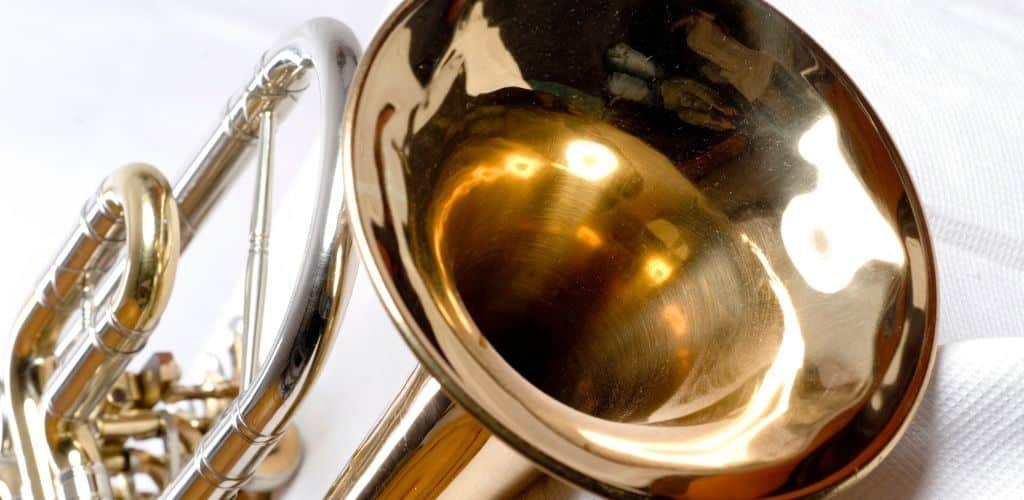
Consider these points:
Quality is paramount; ensure the trumpet’s build complements your musical prowess.
Playability should align with your style, whether jazz riffs or classical pieces.
Here’s a nifty breakdown of what I’ve covered:
Research different brands to find the best fit.
Test-play models to gauge the feel and sound.
Consult professionals or peers who can offer insights on your choice.
Remember, the best trumpet will feel like an extension of your musical soul. Take your time, play a few notes, and you’ll find the one that sings to your rhythm.
Hold on! There’s more…
Check out this article about the 11 Best Trumpet Valve Oil recommendations for keeping your trumpet’s valves in excellent condition and ensuring smooth playability. It’s a helpful guide for trumpet players looking for the best valve oil options on the market.
FAQ's
The best trumpet on the market can vary depending on individual preferences, skill level, and intended use. Some popular options include the Yamaha YTR-8335 Xeno Series, Schilke Bb Trumpets, and Bach Stradivarius Trumpets. It’s essential to consider sound quality, playability, durability, and budget factors when determining the best trumpet for your specific needs. Additionally, trying out different models and seeking advice from experienced players or music professionals can help make an informed decision.
Professional trumpet player often play on various high-quality instruments from reputable brands such as Yamaha, Bach, Schilke, and Monette. The choice of trumpet can vary based on the player’s preference, the musical genre they specialize in, and the specific sound they aim to achieve. Some popular models among professional trumpet players include the Yamaha Xeno series, Bach Stradivarius, and Schilke Bb trumpets, known for their exceptional craftsmanship, sound quality, and playability. It’s important to note that the preference for a particular trumpet model can be subjective and may vary among professional players based on their playing style and musical requirements.
The most sought-after trumpet varies based on personal preferences and musical styles. However, favored options among experienced trumpet players frequently encompass the Yamaha Xeno series, Bach Stradivarius, and Schilke Bb trumpets, recognized for their outstanding workmanship and sonic excellence. A musician’s ideal trumpet is ultimately influenced by their requirements and the desired tonal characteristics.
Both Yamaha and Bach are esteemed trumpet manufacturers, and the choice between the two brass instruments ultimately depends on individual preferences, playing style, and the specific sound a musician aims to achieve. Yamaha trumpets are often praised for their consistent build quality, smooth playability, and versatility across various musical genres. On the other hand, Bach trumpets, particularly the Stradivarius line, are renowned for their classic, rich sound and are favored by many professional players. Musicians should try both brands and select the trumpet that best suits their playing needs and preferences.














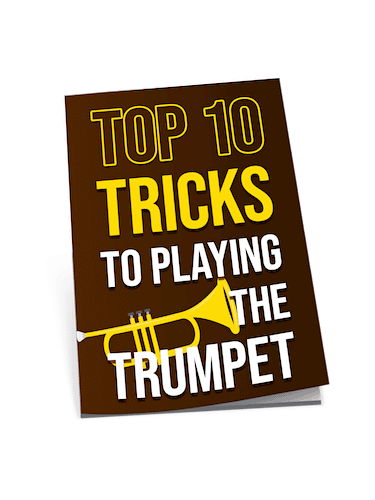
i’ve always wondered how the legends like Louis Armstrong got their sound. is it all in the technique, the trumpet, or a bit of both? it’s crazy how each musician’s sound is kinda like their signature.
I have a bit of a different perspective on the best professional trumpets. While Bach is a phenomenal brand and widely respected, I believe there’s a case to be made for Yamaha’s custom series, which you didn’t mention. Yamaha’s technology and craftsmanship provide a unique blend of sound quality and ease of play, which for some professionals offers better versatility across genres. Wouldn’t you agree that Yamaha deserves a mention among the top professional trumpet brands?
Good points, BrassMaster98 and HornFanatic. Yamaha does make fantastic instruments that suit professionals. They’ll definitely be included in future updates.
I totally agree! Yamaha has some amazing options that deserve recognition.
loving the shout out to jazz trumpet here. it’s an art form and glad to see it getting recognition. keep it up!
Hey Cai Isfryn, just read through your article and I’m kinda stuck on which beginner trumpet to go for. I’m leaning towards the King based on what you’ve described, but can you give me more insight on why it’s a better option over the Besson for someone who’s just starting out? I want to make sure I’m making a smart investment in my first instrument. Thanks for any additional advice!
EllieM, both are solid choices, but the King often provides a smoother playability which can be encouraging for beginners. It’s also known for its durability. However, don’t discount personal preference in how it feels and sounds to you.